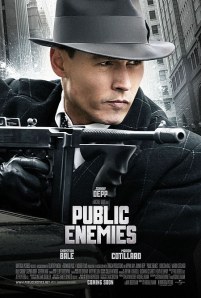‘Public Enemies’: Fight the power
 Though it’s as historically accurate as, say, Mobsters (that ill-fated attempt to recapture Young Guns glory by featuring of-the-moment young actors playing dress up as very famous young criminals), Public Enemies is nonetheless paced, structured, shot and plotted with the same attention for which Mann has been known in films like Collateral, The Insider, Thief and, perhaps most thematically and structurally similar, Heat.
Though it’s as historically accurate as, say, Mobsters (that ill-fated attempt to recapture Young Guns glory by featuring of-the-moment young actors playing dress up as very famous young criminals), Public Enemies is nonetheless paced, structured, shot and plotted with the same attention for which Mann has been known in films like Collateral, The Insider, Thief and, perhaps most thematically and structurally similar, Heat.
Sprawling and visually handsome as its lead actors (Johnny Depp as notorious bank robber John Dillinger and Christian Bale as G-man Melvin Purvis),Public Enemies may not be a deep rumination of last vestiges of outlaw crime during the Great Depression, but as summer entertainment, it is as welcome and comforting as sand between the toes, especially since we’ve been finding it in our shorts for weeks now with such abrasive releases like Land of the Lost, Transformers 2 and Terminator Salvation.
Enemies opens with Dillinger at the peak of his career, bounding over bank countertops (a move that earned him the nickname “The Jack Rabbit”) and sliding in and out with precision as well as manners (“I’m here for the bank’s money, not yours,” he tells a quivering customer.). He’s as caught up in his own celebrity as the public, favoring fancy threads and living in the moment.
When we are briefly introduced to what will be his muse in the film (if not real life), it is easy to be fearful that the role of Billie Frichettte (played by Oscar winner Marion Cotillard) will be one that is merely whimpering arm candy, and to an extent it is. Until the film’s finale, in which Mann structures her to be the fuel that feeds the fire of Dillinger’s final days.
The film flirts with the “other side” of the law, highlighting newly anointed FBI agent Purvis, working directly under J. Edgar Hoover (played with clench-jawed crispness by Billy Crudup) whose career is pinned upon bringing Dillinger and his goons are brought to justice. But Mann knows that it’s fun being bad and gives Depp dialogue that he delivers with the same Jack Sparrow sparkle that endeared him to audiences three times over in the Pirates of the Caribbean films.
Bale’s character may not dominate much of the screen, the actor makes the most of his time, effectively conveying the inner conflict of a man charged with bringing an outlaw to justice by any means necessary but struggling to do things properly and lawfully. The rest of the cast is colorfully diverting enough with their abbreviated bursts onto the screen, and their skill is evident during the last section of the film when Dillinger finds himself out of jail and facing a world in which his brand of lawlessness is no longer tolerated by a public at large.
And while there are a handful of lines the characters share on screen, Mann is known for letting his leads speak with lead. There are several expertly crafted moments ablaze with the spark of Tommy guns and punctuated with only the sound of bullets piercing concrete, metal and occasionally flesh.
But Public Enemies is not only stunning during its battles, as Mann is a master of the palette as well, orchestrating each scene with such coordinated care that it’s easy to see that we are in the hands of someone devoted to the craft of filmmaking: the metallic grays of the jail houses, the linen whites at the horse track, each set has been designed and harmonized with the utmost care.
The only disorienting feeling of watching Enemies is having to watch it through Mann’s HD lens. As a proponent of digital cameras for many years, there is an odd sensation of watching a period piece through the detail of high definition. While some of the backgrounds are striking, it’s attention of every pore of its actors and every thread of their clothing awkwardly juxtapose and era which we have become accustomed to watching through the grain and grit of weathered footage.
Still, it is not enough to detract from the overall impact of the film, which, while perhaps not reaching the operatic heights of the auteur’s best work (Heat, The Insider), still makes for one of the better choices of summer cinema so far this year.



